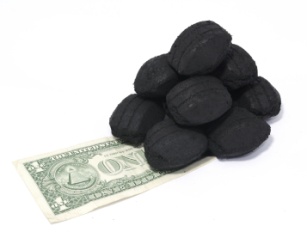
America’s electric utilities (PDF) are waging a no-holds-barred campaign to get 40% of carbon emission permits allocated free to local distribution companies and merchant coal generators. They argue that free allocation will protect consumers better than auctions and cash back. Just give us free permits, they say, and we’ll pass through the savings to our customers.
Sounds appealing. But beware: this is not what happened in Europe. There, utilities got free permits and raised rates anyway, earning billions in windfall profits. See the study by the Energy Research Center of the Netherlands (PDF), which found that a significant part of the value of freely allocated pollution permits resulted in higher electricity prices for consumers and windfall profits for power producers.
And be aware that to get a different outcome in America, 50 state public utility commissions, which regulate over 3,000 local distribution companies, will have to perform with exceptional vigor. Don’t hold your breath.
Also recognize that, even if utilities do pass through the value of free permits by not raising electricity rates, that defeats the purpose of a pollution cap. The purpose of a pollution cap, let’s remember, is to send a price signal that spurs conservation and innovation throughout the economy. To send that signal, the cap must actually raise prices. Without higher prices, we just keep burning cheap, polluting coal.
And here’s another fact: electricity accounts for only about 25% of the average household’s carbon use — the rest comes from gasoline and the carbon embedded in a multitude of products. Giving free permits to utilities does nothing to protect families from price increases outside the electricity sector. Indeed, it may actually raise prices outside the electricity sector and simply shift the economic pain around. That’s because, as economist Dallas Burtraw recently told the House Ways and Means Committee, “The protection of one sector of the economy from changing prices means greater emission reductions must be achieved in other sectors. This raises the cost of using other fuels even further.”
A favorite utility argument is that cash rebates or tax credits don’t address the disproportionate hikes in electricity prices that consumers in coal-dependent states will face, an alleged inequity that only utility-based relief can remedy. But this claim is muted by the relatively even distribution of non-electric energy costs, and the likelihood that these costs will rise faster if electricity is shielded.
Moreover, there are better ways to address regional differences than by giving free permits to utilities. For example, transition assistance could be focused on coal-dependent states, or residents in such states could receive more cash back.
In short:
- Giving free permits to utilities prolongs the burning of coal and delays the deployment of clean alternatives. Along with so-called “carbon offsets,” it makes scientifically driven pre-2020 emission reductions unlikely.
- For purposes of both efficiency and fairness, the price of carbon should be uniform throughout the economy. We shouldn’t favor one sector — much less the dirtiest one — over others.
- If we want to protect consumers, the best way is to raise prices first, then return the higher prices to consumers directly.
What’s most disturbing about the utilities’ campaign isn’t that they’re waging it — that’s what you’d expect them to do — but that the opposition has been so feeble. Barack Obama during the presidential campaign came out for auctioning 100% of pollution permits, and recently his budget director, Peter Orszag, declared, “If you don’t auction the permits it would represent the largest corporate welfare program that has ever been enacted in the history of the United States.” Obama’s budget calls for auctioning 100% of permits and returning most of the revenue to consumers through tax credits. But now the White House seems to be waffling on auctions, and the silence on Capitol Hill has been stunning.
So we may be heading for yet another giveaway of public wealth to private corporations — first banks, then auto companies, now utilities. The irony is that utilities aren’t failing and won’t be hurt by a carbon cap with auctions — they’ll surely pass permit costs through to customers. What we’re seeing here is simply a well-organized interest group trying to draw cash from the public till, and almost no one in Washington minding the store.



